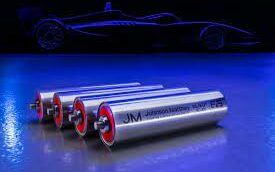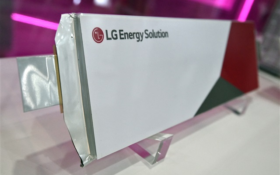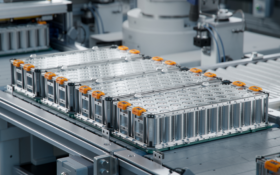UK technology firm Johnson Matthey has announced a major u-turn in its lithium-ion battery goals and will abandon plans to commercialise its high nickel cathode (eLNO) materials.
Due to inadequate “potential returns”, the company has decided to begin the process of selling “all or parts” of this business with the “ultimate intention of exiting” the market.
The surprise announcement comes as the firm was gearing up to build eLNO plants in the UK, Finland and Poland capable of manufacturing a total of 50kT of the material.
Only last month, the firm was preparing to unveil a race car that used the first full size lithium-ion battery cells featuring eLNO cathode technology.
A Johnson Matthey (JM) press release stated it had been exploring strategic partnerships in recent months, but it had become clear its capital intensity was too high compared with other more established large-scale, low-cost producers.
The announcement accompanied news that the firm’s chief executive Robert MacLeod was set to retire from his position.
MacLeod said of the eLNO decision: “While the testing of our eLNO battery materials with customers is going well, the marketplace is rapidly evolving with increasing commoditisation and lower returns. We have concluded that we will not achieve the returns necessary to justify further investment.
“This decision will allow us to accelerate our investment and focus on more attractive growth areas, especially where we have leadership positions such as in hydrogen technologies, circularity and the decarbonisation of the chemicals value chain.”
New chief executive
Johnson Matthey has announced that Liam Condon will be the company’s new chief executive, starting on 1 March 2022.
Condon is a member of the board of management of Bayer AG and president of the Crop Science Division.
MacLeod, who has been the firm’s chief executive for nearly eight years, will stay on to support the transition process until the company’s annual general meeting on 21 July 2022 when he will then retire from JM.
Hydrogen technologies
Just two days before the 11 November announcement, JM confirmed it would invest around £1 billion ($1.3 billion) in the research, development and deployment of clean hydrogen technologies by 2030.
A JM statement read: “JM is making good progress in its other growth areas, such as in hydrogen technologies, circularity and the decarbonisation of the chemicals value chain.
“These are attractive opportunities which we will now accelerate with greater focus and investment.
“In addition, in a world that increasingly needs solutions to address the challenges faced by climate change, we will continue to pursue opportunities across other areas that are closely aligned to our core capabilities.”
In July, JM finalised the acquisition of the intellectual property and assets of fellow UK firm and lithium-sulfur pioneer Oxis Energy.
As well as acquiring the assets and intellectual property of Oxis Energy, Johnson Matthey will also take up the lease at its premises in Culham Science Park, Oxford, UK.
A Johnson Matthey spokesperson told BEST at the time: “With moderate additional investment in upgrades, this transaction will significantly accelerate the scale-up of JM’s growing Green Hydrogen business.
“The physical assets of Oxis Energy serve multiple purposes: the physical assets at the Culham Science Park location allows JM’s Green Hydrogen business to develop, test, and produce catalyst coated membranes; battery testing equipment provides additional testing and quality control capability for Battery Materials product development
“The Intellectual property relating to lithium-sulfur battery technologies —a disruptive next generation battery materials technology — presents opportunities for JM’s Battery Materials business to advance its development of future battery materials technologies.”












